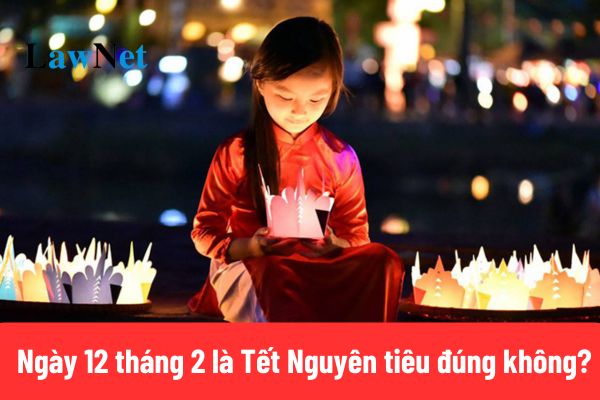Is February 12 the First Full Moon Festival 2025? What are the regulations regarding the educational activities of primary schools in Vietnam?
Is February 12 the First Full Moon Festival 2025?
"Tết Nguyên tiêu" or First Full Moon Festival (the 15th day of the first lunar month), is the first full moon of the lunar new year, carrying significant meaning in East Asian culture, especially in Vietnam and China.
Specifically, "Nguyên" means first, while "Tiêu" means night; therefore, the First Full Moon Festival is the first full moon night of the year. This day is also called the Upper Nguyen Festival to distinguish it from the Mid Nguyen Festival (the Full Moon of the Seventh Month) and the Lower Nguyen Festival (the Full Moon of the Tenth Month). For Buddhists, this is an important occasion for Buddhist rituals, reflected in the saying: "Offering year-round is not as good as offering on the Full Moon of the First Month."
According to the lunar calendar for February 2025:

Thus, Wednesday, February 12 of the solar calendar (i.e., the 15th of the first lunar month) is the First Full Moon Festival 2025.
On the First Full Moon Festival 2025, families usually prepare a feast to worship the Buddha and their ancestors, wishing for a peaceful and favorable new year. In Vietnam, Buddhists often visit pagodas to worship the Buddha, reciting the Medicine Buddha Sutra for blessings. Meanwhile, the Chinese organize lantern festivals, releasing lanterns to pray for peace. Temples frequently conduct Medicine Buddha ceremonies and recite sutras throughout the first month to bring virtuous blessings to everyone.
Note: Information is for reference only.

Is February 12 the First Full Moon Festival 2025? (Image from the Internet)
What are the regulations regarding the educational activities of primary schools in Vietnam?
According to Article 19 of the Primary School Charter issued with Circular 28/2020/TT-BGDDT, the regulations regarding the educational activities of primary schools in Vietnam are:
- Educational activities are organized within and outside the classroom to shape character, develop abilities; educate ethics and lifestyle; cultivate talents; and support students in completing learning tasks suitable to the psychological characteristics of the age group.
- The form of educational activities for students is organized flexibly according to the goals and nature of the activity, where students are organized to work independently, in groups, or collectively under the guidance and support of teachers, ensuring each student has the opportunity to independently carry out learning tasks and experience reality.
- Educational activities are organized within and outside the classroom through various forms, including theoretical learning, practicing exercises, experiments, games, role-playing, study projects, clubs, excursions, camping, reading, collective activities, and community service activities.
What are the rights of primary school students in Vietnam?
Under Article 35 of the Regulations issued with Circular 28/2020/TT-BGDDT, the rights of primary school students in Vietnam are:
- The right to study
+ To be educated and study to fully develop and best utilize one's potential; to study in a convenient school or grade implementing the primary education program near their residence.
+ Students can choose a school or transfer to another school outside their residence area if that school can accommodate them.
+ Primary school-aged students returning from overseas, children of foreigners studying and working in Vietnam, or children unable to attend school due to difficult circumstances who wish to attend a primary school can have their principal organize a proficiency test to place them in an appropriate grade.
+ Students with disabilities are entitled to be integrated into a primary school; have conditions for study and training ensured; and receive an education plan fitting their conditions.
+ Students may reduce the time needed to complete programs, study at an older age, repeat grade years, or skip grades.
+ Students with good physical and mental development can skip grades within the education level. The procedure for review in each specific case is as follows:
Parents or guardians of students submit a request to the school.
The school principal establishes the Advisory Council, including the principal or vice-principal, the Parent committee of the school; the teacher of the current grade, the teacher of the higher grade, the medical staff, and the Leader of the Ho Chi Minh Young Pioneer Organization.
Based on the Advisory Council's survey results, the principal completes the dossier and reports to the Director of the Department of Education and Training for decision.
+ Students whose learning outcomes are still limited, despite being directly guided and assisted by teachers, parents, or guardians, and still not completing their tasks, may, depending on the extent of incompletion, have the teacher report to the principal for a decision on advancement or retention, alongside with the family deciding on suitable educational measures.
- The right to be protected, cared for, respected, and treated equally and democratically; ensured legitimate rights and interests; adequately informed on their study and training process; assured conditions of time, facilities, hygiene, and safety to study and train.
- The right to participate in activities that showcase individual capabilities; and express personal opinions and wishes.
- The right to receive scholarships and enjoy social policies as regulated.
- The right to enjoy other rights as prescribed by law.

